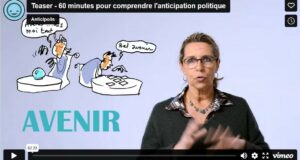A new paradigm is born that citizens must be educated to. An adaptative education programme is required now, it must be implemented fast and it should target wide. The reference to the “Marshall plan” hints at the urgency and scope this programme must take in order to secure a desirable future for our continent.
For this reason LEAP is a key partner of this open letter/petition promoted by EU Resilience Collective created on the basis of future thinker Raphaëlle Bidaut-Waddington’s column first published in La Tribune, March 30th.
Read and don’t forget to sign if you approve!
Sign petition
To the attention of : Ursula von der Leyen, David Sassoli, Charles Michel, Christine Lagarde, Mario Centeno, Werner Hoyer, and all European and national representatives willing to act now.
The prognosis is all too clear: covid-19 is provoking an unprecedented economic crisis and unemployment wave that will be long, painstaking to get through and expensive to resorb. The International Labor Organization has already announced an expected loss of 12 million full-time jobs in Europe in 2020. Without a doubt, this will put EU and national welfare systems at risk. We also know that a systemic crisis and high unemployment bring with them the additional risks of democratic decline and increased inequality. We are only at the beginning of the tsunami wave but it is possible to limit its impact by acting now.
With this letter, we would like to bring to your attention a resilience strategy, fully compatible with your ideas and projects such as the Green New Deal, the digital transition and the EU knowledge-based and creative society. It represents a real future promise for Europe and for all generations. European youth needs a hopeful horizon to engage positively in the future.Instead of waiting for the collapse, our proposition is to transform the disintegration period we are in, into an opportunity to learn, train ourselves, innovate, design a fair post-crisis world, incubate projects, prepare the renaissance, and re-orient the economy toward a green, digital and inclusive economy. Not everything will be perfect, but the eco-systemic dynamics we propose is meant to lead toward a new form of collective prosperity compatible with Sustainable Development Goals.
Making a mass investment into education and training will kick-off a very virtuous and future-oriented dynamics, stop the unemployment explosion, and even help reshape our value-creation ecosystems to make them green and inclusive.Concretely, this large scale EU investment plan and resilience dynamics work in 3 steps:
1 – Help companies to keep their staff employed by putting them in remote or local training programs to develop the most advanced skills, innovate and look for new low carbon sources of value(s) (circular economy, short circuits, digital potentials, new forms of utility and contributions, etc.),
2 – Help European citizens, both unemployed and employed (not forgetting students) to develop “future-proof” skills via training programs, reshape their professional figures and take initiative toward a more sustainable world.
3 – Create a number of training jobs, thus giving immediate work opportunities for unemployed as well as the independent workers who are already vulnerable.
Why is this important?
In this scenario, the population remains active, included and empowered rather than waiting, insecure, devalued and marginalized (classic unemployment patterns).
This strategy also fosters pedagogical innovation toward hybrid and future oriented formats, coupling knowledge, creativity, experimentation and the incubation of projects. In this plan, learning is exciting and looks like a laboratory where knowledge is mixed with experience. Besides schools and universities, innovation hubs, third places and cultural centers can develop such training offers. Many of them already do and often pioneer in developing knowledge commons. Whether in the shape of prototypes, start-ups, associations, platforms, collaborative projects or ad hoc events, these projects will become the renaissance engine, slowly growing while the covid-19 is being sorted. The design of sustainable and innovative economic models comes with relevant prototypes.Soon this buoyant societal dynamics will give birth to a new structural and circular immaterial, knowledge and creativity-based economy, converging toward the Green New Deal, fully compatible with core EU emancipatory and educational values, and becoming a new collective future purpose. With this strategy, the EU can renew its political economy and become again a future promise for the young generations, and for all.
More pragmatically, we are convinced that the recovery cannot happen by itself and that a mass investment in future-oriented training will reduce unemployment more rapidly in time and numbers. Such an approach will ultimately be more “profitable” for public finances, not even counting the additional climate and citizen benefits, European autonomy gain, and the construction of new knowledge commons for a shared prosperity.
A rapid implementation and distribution of funds could be done via digital platforms (at EU or regional levels) to match training offers and demands, and guarantee that the investment leads to local jobs.
We trust for you for acting now and remain fully available to help you make it happen!
Raphaële Bidault-Waddington, founder of LIID Future Lab, Paris.
In collaboration with Marie-Hélène Caillol, president of the Laboratoire Européen d’Anticipation Politique (LEAP 2040), Paris.
Sign petition
With the support of a growing EU Resilience Collective. Please sign to join forces:
– Daniel Amesz, president of AEGEE European Student’s Forum, Belgium.
– Stéphanie Ampart, fairy activist for So Good Media, HiFlow Geneva and Synergie Family, France.
– Michel Bauwens, founder of the P2P Foundation, Belgium.
– Lorraine de Bouchony, Founding president of Welcome Europe.
– José María Compagni Morales, Docensas SL, U, Spain.
– Marie-Pierre Dequier, co-founder of CollectivZ and France Apprenante, France.
– Uffe Elbaek, founder of the KaosPilot School and the Alternative, Denmark.
– Antonino Galloni, economist, president of Centro Studi Monetari, Italy.
– Fabienne Goux-Baudiment, Founding President, ProGective, Paris, France.
– Anne Kjaer Bathel, CEO and Co-founder of ReDI, European Young Leaders (EYL) Network, Germany.
– Juan Laborda, Professor of economy and finance, Universidade Carlos III de Madrid, Spain
– Dan Luca, VP Strategic Innovation of EURACTIV group, and Associate professor at SNSPA, Bucharest, Roumania.
– Marco Moiso, Vice president Supervisor Movimento Roosevelt, IT/UK
– Cédric du Monceau, 1st Substitute in the Belgian European Parliament cdH/EPP, Belgium.
– Harald Neidhardt, CEO and Curator, Futur/io Institute, Germany.
– Eudald Parera Riera, Corporate Director of Training, FERRER, Spain.
– Marianne Ranke-Cormier, Franck Biancheri Network and president of #CitizensRoute, France.
– Claire Souvigné, director of Bachelor, American BBA & MSc /MBA programs, INSEEC Group, France.
– Gavin Starks, founder of Dgen, and previously the Open Data Institute, UK.
– Veronique Swinkels, Founder of Go-for-Good, NL.
– Astrid Szogs, Regionalmanagement Northern Hesse, MoWiN network and New Club of Paris, Germany.
– François Taddei, Directeur du Centre de recherches Interdisciplinaires,Paris, FR
– Adrian Taylor, Foresight to Strategy for Sustainability and Security in Governance (4Sing), Germany.
– Wim Veen, Em. Professor, Delf University of Technology, and founder of allyoucanlearn.com, Netherland.
– Olivier Zara, Founder of BrainShip collective intelligence academy, Montreal, Canada
– Maria Zei, Supervisor Movimento Roosevelt, Italy/France
Sign petition
Original socio-economic resilience strategy published in La Tribune, March 30th, and in English on medium.com, April 11th


 LEAP2040 Toutes les informations et archives Europe2040
LEAP2040 Toutes les informations et archives Europe2040



